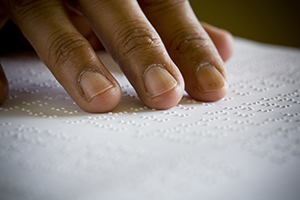
Photo: iStock
Bursary funding for eight students with disabilities at the University of the Free State was recently approved by the First Rand Foundation. The grant of R2 497 440 will be paid over three years: R800 000 (2016/17), R824 000 (2017/18), and R873 440 (2018/19).
This grant from the First Rand Tertiary Education Fund is a result of the negotiations between the UFS Office for Institutional Advancement and the First Rand Foundation (FRF).
Qualifying students with disabilities will be encouraged to apply for bursaries according to criteria and requirements set by the First Rand Foundation. The selection process will be handled by a panel from the UFS. The Centre for Universal Access and Disability Support (CUADS) at the UFS will be instrumental in the process of identifying students with disabilities who meet the criteria and requirements for funding.
CUADS already have a system in place to support students with disabilities in their studies and during exams. Students also have access to specialised exam and test venues for alternative test and exam procedures, as well as computer facilities.
Specialised support services include an amanuensis (scribe) service during tests and exams, accommodating extra time, individual tutor sessions provided in collaboration with the Centre for Teaching and Learning, South African Sign Language interpreter coordination, provision of accessible study material, and individual disability support.
“The centre aims to ensure that the university increasingly becomes a universally accessible environment that is welcoming and accepting to people with diverse abilities.”
According to Martie Miranda, Head of CUADS, the centre aims to ensure that the university increasingly becomes a universally accessible environment that is welcoming and accepting to people with diverse abilities. “Therefore disability awareness training and advocacy within the UFS, and specifically among staff members, is one of our priorities,” she said.
According to Thandeka Rantsi from the FRF, the company will furthermore support students in CUADS with regards to the needs ensuing from the #feesmustfall protests. “Exactly R34 000 was approved by the FRF for 14 students towards residence and meal expenses, as well as scribe and reader assistance during additional assessments,” she said.